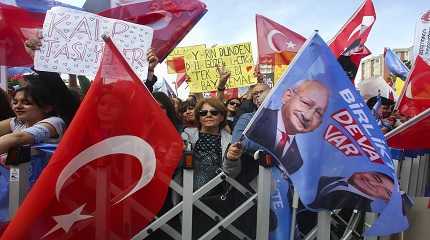
ANKARA, May 14. /TASS/: More than 64 million Turkish citizens will cast their ballot in the presidential and parliamentary elections on Sunday.
The elections are special partly because they are held during the year when the Republic of Turkey is marking its 100th anniversary.
Polling stations will be open between 8:00 a.m. and 5:00 p.m. local time (same as Moscow time). Overall, a total of 191,884 ballot boxes will be installed in the country and abroad.
TASS correspondents in Ankara and Istanbul reported that security was beefed up a few days before the vote to make sure that citizens exercise their right to vote safely.
Three candidates are participating in the presidential election. A candidate needs to receive more than 50% to avoid a runoff. However, local political experts see the possibility of a second round, which, in this case, will be held on May 28.
Presidential candidates
Incumbent President Recep Tayyip Erdgoan, who is the leader of the Justice and Development Party (AKP or AK Party) is seen as a frontrunner. He has been at the helm of Turkey since 2003, first as the prime minister and since 2014 - as the president. Erdogan is known for his conservative views and determination to increase his country's independence in key areas, such as defense industry, energy and economy. He favors close ties with Russia, particularly in energy and defense cooperation, despite differences over the issue with the West.
His main rival is Kemal Kilicdaroglu, the leader of the main opposition party - Republican People's Party (CHP). It is the oldest political party in Turkey, founded by Mustafa Kemal Ataturk, the first president and founder of the modern Turkish Republic.
Kilicdaroglu is a staunch critic of president Erdogan and his policies, particularly his views on democracy and human rights. Kilicdaroglu favors closer ties with the European Union and the United States, and has a cautious approach to relations with Russia.
Sinan Ogan is a candidate representing the right-wing Ancestral Alliance. He has been criticizing both Erdogan and Kilicdaroglu, claiming that they have been unable to resolve problems that Turkey is facing now. Ogan is known for his nationalist views and calls for a more active Turkish military interference in Syria. He also criticized Russia, claiming that its military operation in Syria and support for Syrian President Bashar Assad pose a threat to Turkey’s security.
Possibility of a runoff
As the presidential vote is approaching, opinion polls indicate a more and more active rivalry between the candidates.
Shortly before the vote, Turkey’s main election authority, the Supreme Election Council, announced that it would not annul votes for Muharrem Ince, who withdrew his candidacy. According to Turkish pundit Necati Ozkan, the decision made a runoff more likely, because it would make it more difficult for any of the candidates to garner the required amount of votes.
However, the two main contenders - Erdogan and Kilicdaroglu - are absolutely convinced that they would defeat the opponent in the first round.
A TASS correspondent, who visited an opposition rally in Ankara on Friday, Kilicdaroglu and his supporters wore badges calling to "finish it in the first round."
Meanwhile, Erdogan, who attended a rally in Istanbul on Saturday, also said he was sure to win in the first round and urged his supporters to "do their best" to attain this goal and to "achieve it at polling stations." In his opinion, the results of the vote will send a message to US President Joe Biden, who expressed his support to Kilicdaroglu a few years ago.
Parliamentary elections
Along with presidential vote, citizens of Turkey will also elect members of the Grand National Assembly, Turkey’s unicameral parliament. A total of 36 parties are contesting parliamentary seats.
Erdogan’s Justice and Development Party has joined forces with the Nationalist Movement Party (MHP) and the pro-Islamic conservative New Welfare Party to form the People’s Alliance.
The opposition has created its own Nation Alliance, comprising the Republican People’s Party, the nationalist Good Party (led by former Interior Minister Meral Aksener) and the pro-Islamic Felicity Party. The coalition also includes three center-right parties: Democrat Party, Future Party (formed by former Prime Minister Ahmet Davutoglu, who was in the office between 2014 and 2016) and Democracy and Progress Party (led by Ali Babacan, who served as the foreign minister in 2007-2009).
Three alliances of small parties will also try to win parliamentary seats -Labor and Freedom Alliance, Ancestral Alliance and Union of Socialist Forces.




